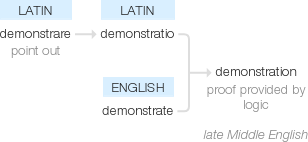Demonstration
late Middle English (also in the senses ‘proof provided by logic’ and ‘sign, indication’): from Latin demonstratio(n- ), from demonstrare ‘point out’ (see demonstrate). demonstration (sense 3) dates from the mid 19th century.
wiktionary
From Middle English demonstracioun, from Old French demonstration, from Latin demonstrationem, from demonstrare(“show or explain”), from de-(“of or concerning”) + monstrare(“show”). Morphologically demonstrate + -ion
etymonline
demonstration (n.)
late 14c., demonstracioun, "proof that something is true," by reasoning or logical deduction or practical experiment, from Old French demonstration (14c.) and directly from Latin demonstrationem (nominative demonstratio), noun of action from past-participle stem of demonstrare "to point out, indicate, demonstrate," figuratively, "to prove, establish," from de- "entirely" (see de-) + monstrare "to point out, reveal show," which is related to monstrum "divine omen, wonder" (source of monster). Both are derivatives of monere "to remind, bring to (one's) recollection, tell (of); admonish, advise, warn, instruct, teach," from PIE *moneie- "to make think of, remind," a suffixed (causative) form of the root *men- (1) "to think."
Sense of "exhibition and explanation of practical operations" is by 1807. Meaning "public show of feeling by a number of persons in support of some political or social cause," at first usually involving a mass meeting and a procession, is from 1839. Related: Demonstrational.
